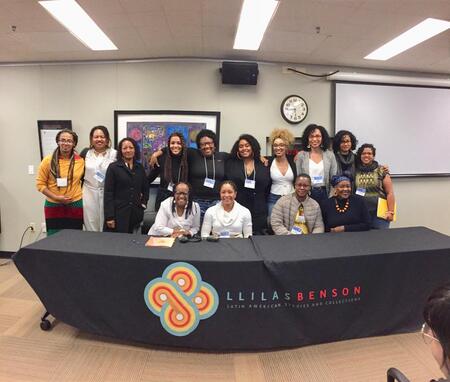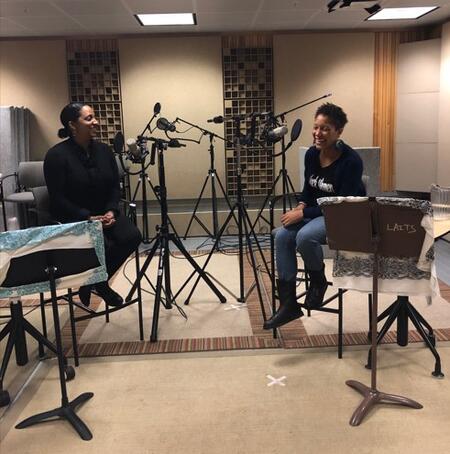The sociocultural anthropologist studying the performance of state violence in Brazil
By Michaela Herrmann
Every year, Yale’s Faculty of Arts and Sciences hires dozens of exceptional scholars in academic departments across the sciences, humanities, and social sciences. This series profiles six of the faculty joining the FAS in the 2024—25 academic year, highlighting their academic achievements, research ambitions, and the teaching they hope to do at Yale. Learn more about the incoming ladder faculty and multi-year instructional faculty joining the FAS.
As a sociocultural anthropologist, Christen Smith is always thinking about how performance shapes communities. Depending on the context, performance can constitute acts of cultural expression, protest, or even oppression—and her research illuminates all three.
Her research centers the African diaspora, specifically in Brazil. She studies the impact of violent policing on Black communities and their responses to that violence. Her acclaimed first book, Afro-Paradise: Blackness, Violence, and Performance in Brazil (2016, University of Illinois Press), explored how those communities engaged in performance—particularly theatre—to speak out against racism and anti-Blackness. “To use a more jargon-y term, my first book focused on the necropolitics of the state as a kind of performance—how we can think of police violence as its own theatrical dance that the state performs to perpetuate forms of inequality, marginalization, and abjection.”
Smith, who joins the FAS as Associate Professor of Anthropology and African American Studies, hopes her joint appointment will yield deep, exciting collaborations.
“I have always been a fan of the intersections between African American Studies and Anthropology at Yale. I think that it presents a unique opportunity for students to engage with African diaspora anthropology in ways that are wonderful,” she says.
A prolific and creative scholar, Smith has published three books (with a fourth on the way) before arriving at Yale. Her two main strands of research—the impact of police violence on Black communities and the erasure of Black women’s intellectual and creative contributions—are intimately interwoven in both her academic work and the projects she pursues beyond scholarly writing.
As she worked closely with affected communities while researching Afro-Paradise, Smith noticed the distinct impact police violence was having on Black women. “Black women often die in the months and the weeks after their family members have been killed, but we’re not counting those deaths as killings,” Smith points out. “Black women in particular seem to be the invisible victims of policing.”
Failing to recognize the psychological and somatic trauma that police violence inflicts on victims’ friends, families, and neighbors “occludes the impact of violent policing on Black communities, because we’re only thinking about the body counts that are in front of us.”
These realizations, together with rigorous historical, ethnographic, and theoretical research, inform Smith’s current book project, Frequency: Black Women in the Atlantic. That book will examine the sequelae—or the lingering effects—of police violence on Black women and their communities in Brazil and the United States. “‘Sequelae’ is a word that basically means a disease that you develop as a result of another injury or disease,” Smith explains. “So the next book will explore the gendered impact of police violence on Black women and the sequelae that police violence produces: things like heart attacks, strokes, depression, and anemia.”

That led Smith to her second major research interest and the foundations of her second and third books: The Dialectic Is in the Sea: The Black Radical Thought of Beatriz Nascimento (2023, Princeton University Press), the first English translation of the historian, public intellectual, activist, and poet’s work; and Black Feminist Constellations: Dialogue and Translation Across the Americas (2023, University of Texas Press), an essay collection that Smith co-edited with Lorraine Leu, a professor of Latin American Cultural Studies at the University of Texas. “I wanted to explore Black women’s intellectual contributions to the Americas and our creativity, specifically the Black feminist movement and transnational Black feminism, and the ways that Black women have been erased or otherwise overlooked in the scholarship,” Smith says of both books.
The Dialectic Is in the Sea was an intensive five-year project that aimed to do two things: “present Nascimento’s work to an English-speaking audience and situate it within the Black radical tradition in the Anglophone Academy,” and redress her exclusion from English-language academic literature. Smith worked with Nascimento’s daughter Bethânia N.F. Gomes and translator Archie Davies to engage in the Black feminist practice of dialogic translation and ensure Nascimento’s ideas came across with the correct historical and intellectual context.
Black Feminist Constellations emerged around this time, too, growing out of a conference Smith and Leu co-hosted in 2020, right before the COVID-19 pandemic. “We brought together around a dozen Black women who are artists, intellectuals, and organizers, and had the most amazing encounter where we exchanged our thoughts about Black feminism and Black women’s intellectual contributions across borders,” Smith reflects. “It was a beautiful, moving moment, and resulted in a multilingual set of real-time reflections on what Black women’s intellectual contributions mean to the Americas.”
Smith has successfully translated her work beyond traditional academic settings: she started the movement Cite Black Women in 2017 to raise awareness of the citational erasure of Black women’s scholarship. “Writing about Black women’s struggles has always been a passion of mine,” she says, “but Cite Black Women went viral in a way that I was not expecting.”
The social media and T-shirt campaign has grown to include a collective for Black women scholars, special issues of academic journals, and a Cite Black Women podcast—proof that academic work doesn’t have to be restricted to university classrooms. “We took a bit of a hiatus last year because I was on leave, so I’m excited to get back into the studio and start recording the podcast, and to expand and deepen it.”
Cite Black Women is just one of the many projects Smith is excited to bring with her to Yale. It’s exemplary of the throughline present in all of her work: uplifting the voices and contributions of others, particularly those of Black women.
Smith’s spirit of collaboration and commitment to open dialogue carries through to her teaching. She’s overflowing with ideas for new classes; African diaspora anthropology, global Black feminism, and Blackness in Latin America are just a few of the possibilities. She’s eager to hear students’ thoughts about what they’d like to learn, too. “When students come to me with ideas, one of the fun things I like to do is to make a class up based on their suggestions,” she says, clearly thrilled at the potential. “I taught one class, for example, at the end of the pandemic called ‘Feminist Collective Care,’ in which we thought about what it means for us to care for one another, because that was on everybody’s mind at the time.”
Smith can’t wait to see what life at Yale brings, both in the classroom and beyond. “It might sound so mundane, but I’m really looking forward to hiking East Rock and looking down from that high point,” she says. “It’s a whole new adventure. I’m excited to see what Yale’s going to bring to my life and what I’m going to bring to Yale.”
Image 2: Smith speaking at a launch event for her book The Dialectic Is in the Sea: The Black Radical Thought of Beatriz Nascimiento.
Image 3: Smith with attendees of the 2020 Lozano Long Conference: Black Women’s Intellectual Contributions to the Americas.
Image 4: Smith recording an episode of her podcast Cite Black Women.












